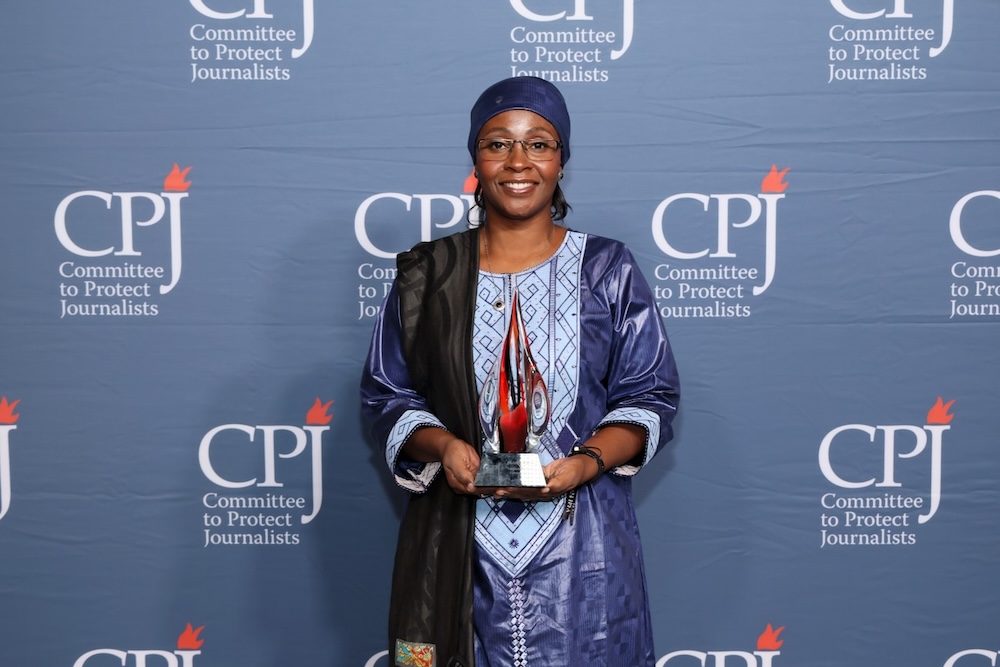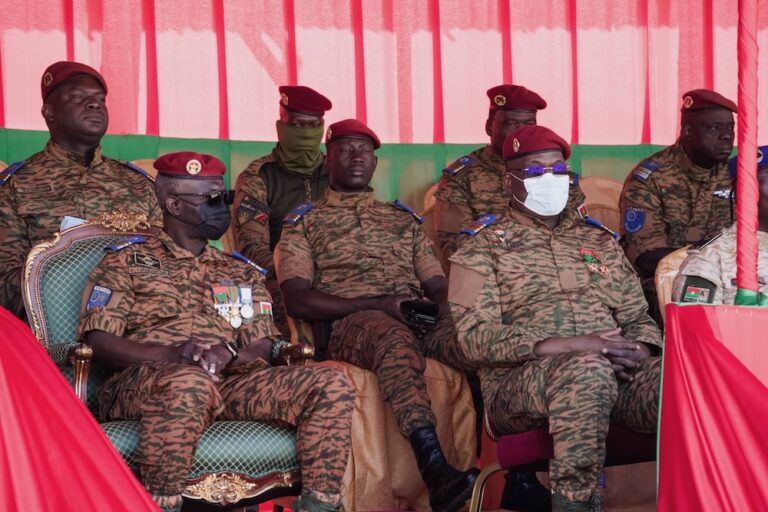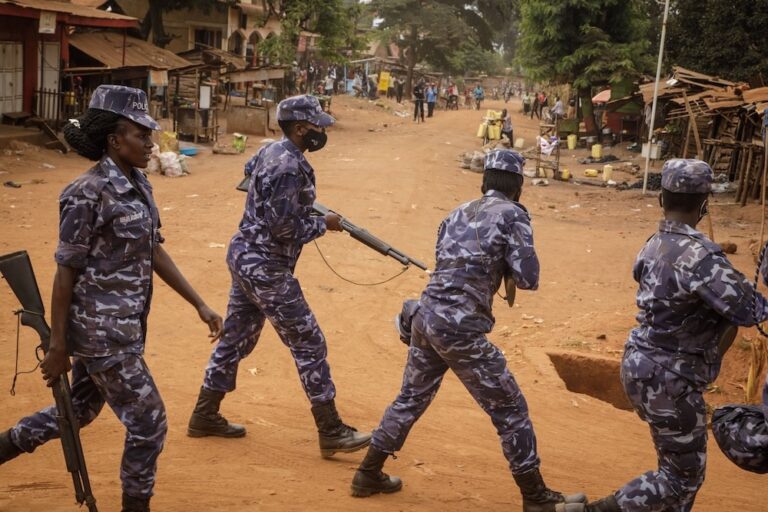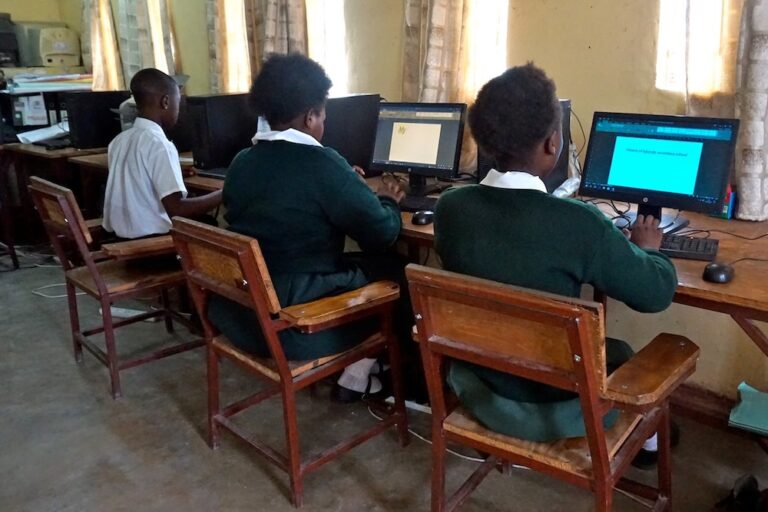November 2024 in Africa: A free expression and civic space round-up produced by IFEX's Regional Editor Reyhana Masters, based on IFEX member reports and news from the region.
The focus this month is on the severe consequences of impunity, with the recent killing of journalists in the Democratic Republic of Congo, Benin’s constricting media regulation, and the transnational suspension of a television station’s license.
Just days before Africa’s media community gathered in Addis Ababa to commemorate the International Day to End Impunity for Crimes Against Journalists (IDEI), Congolese broadcast journalist Yoshua Kambere Machozi was brutally killed by M23 rebels in the Walikale territory of eastern North Kivu province. According to the Committee to Protect Journalists (CPJ), a village resident who witnessed the attack reported that M23 rebels slit Kambere’s throat and threw his body into the nearby Mweso River.
Over a month earlier, Edmond Bahati Monja, the coordinator of the Catholic radio station Maria, was shot and killed at close range in Goma on the evening of 27 September.
Journalists and the media are constantly being caught in the crossfire in conflict ridden Democratic Republic of Congo, with Reporters Without Borders (RSF) warning of the creation of an information desert as radio stations are either captured, vandalised or shut down.
Samira Sabou honoured by CPJ
On an optimistic note, prominent Nigerién investigative journalist Samira Sabou was one of four beneficiaries of this year’s CPJ International Press Freedom Awards.
Sabou has been at the receiving end of a protracted legal onslaught and has had to contend with arbitrary arrests and prolonged detention due to her reporting on governance issues. Despite being provisionally released after her arrest in September 2023 on espionage charges that were later dropped, Sabou continues to face ongoing legal challenges. This includes a pending appeal from a 2022 cybercrime conviction and an unresolved 2020 case, reflecting the broader struggles of journalists in the Sahel under post-coup regimes.
Speaking at the awards ceremony held in New York on 22 November, Sabou explained her resolve:
“For my part, it is difficult if not impossible to erase the painful episodes of our multiple arrests during the coverage of public demonstrations, the assaults by the police at my residence, not to mention my imprisonment while I was several months pregnant. I am still moved by the thought of these painful events linked to the exercise of my beautiful profession.”
Mauritius’s digital rights decline
On 1 November, authorities in Mauritius announced the suspension of social media services. The disruption – just a week before polling day – was closely linked to leaked audio recordings involving politicians, senior police officers, journalists, and foreign diplomats, which the government had described as “a serious threat to national security and public safety.” Pressure from opposition groups, citizens, and national, regional and international rights activists pushed authorities into removing the suspension.
Five journalists were also caught up in the “wiretapping scandal”, prompting RSF to suspect widespread surveillance, which would require “an independent enquiry to identify those responsible for the wiretapping.”
In her analysis for The Conversation, Roukaya Kasenally, an associate professor at the University of Mauritius, suggested the disruption was indicative of declining digital rights in the country. “The social media ban must be contextualised as part of a generalised erosion of democratic rights and liberties in Mauritius. This trend has been happening over the last 10 years, but has accelerated since 2019 due to the introduction of a number of projects aimed at monitoring and controlling data,” she explained.
ACHPR Resolution 620 passed
The African Commission on Human and Peoples’ Rights adopted Resolution 620 on Promoting and Harnessing Data Access as a tool for Advancing Human Rights and Sustainable Development in the Digital Age.
The resolution recognises the gaps in protection of privacy, highlights concerns around the exploitation of data on the African continent, and lays out recommendations for member states to ensure data practices are transparent, accountable, and align with global standards.
In keeping with this ideal, it directs the Special Rapporteur on Freedom of Expression and Access to Information in Africa to create guidelines for how data should be collected, used, and accessed and also to support initiatives that encourage and safeguard access to data throughout Africa.
Benin public broadcaster’s transformation into state media
Since the beginning of 2024, an editorial committee established through a presidential decree is in control of all news flow coming out of the Benin Radio and Television Company (Société de Radio et de Télévision du Bénin – SRTB).
The country’s public broadcaster was subsumed into the SRTB through the integration of Benin Radio and Television Office and the Multimedia Center for Adolescents and Youth of Benin, which operates Ado TV and Ado FM.
News reports are sent on a daily basis to an editorial committee comprised exclusively of members from the office of the presidency and three ministries, whose role is to review and approve all programmes. Through this process, numerous programmes have been taken off the air under the vague premise of “professionalising productions”.
Concern has also been expressed by RSF about “the political directives imposed on the media in Benin through government ‘guidance notes’ telling newsrooms what information should be published, and through ‘partnerships’ encouraging the media to prioritise reporting on government activities”.
Censorship crosses borders
In response to a complaint by Burkina Faso’s regulator (Conseil Supérieur de la Communication – CSC), its counterpart in Mali, the High Authority for Communication (HAC), withdrew Djoliba TV News’ operating license.
This collaboration in transnational repression sets a risky precedent as it has the potential to encourage government authorities to reach across to their counterparts in other countries to censor freedom of expression. “While the discussions hosted by Djoliba TV News have occasionally sparked controversy, it is difficult to accept that this in itself is sufficient grounds for such a radical sanction,” argues the Media Foundation for West Africa (MFWA).
The CSC initiated this action in a letter dated 12 November, accusing Djoliba TV News of undermining the government following a programme in which columnist Issa Kaou N’Djim questioned official communications about a coup attempt in Burkina Faso. Djoliba TV News has faced HAC’s anger before, in November 2022, when the outcome was a two-month suspension for criticising Mali’s prime minister, Choguel Kokalla Maiga, for “his tone and posture during his speech at the United Nations General Assembly [which] were hostile and not very diplomatic.”
Uganda’s landmark ruling pays tribute to media freedom
In October, in a landmark ruling, the High Court in Kampala awarded journalists Timothy Murungi and Henry Sekanjako just over US$20,000 as compensation for the injuries they suffered in 2021, when they were assaulted while covering the handing over of a petition to the United Nations Human Rights office by Robert Kyagulanyi, aka Bobi Wine, the leader of the opposition National Unity Platform party.
The court ruled that: “the rights of the journalists to freedom of the press and the media provided for under Article 29(1)(a) of the Constitution were violated by respondents” – in this case, the army.
Celebrating the court’s decision, Robert Ssempala, the executive director of the Human Rights Network for Journalists (HRNJ-Uganda), stated:
“This ruling sends a powerful message that journalists’ rights are non-negotiable. We will not be silenced or intimidated.”
He further emphasised that “the court’s decision underscores the vital role of a free press in holding those in power accountable.”
In brief
On 14 November, the ECOWAS Court of Justice ordered Sierra Leone to pay US$15,000 each, to Hassan Kargbo and Mohamed Fornah, in compensation for breaching their basic right to safety, during a violent protest crackdown in 2020. Sierra Leone failed to appear or defend itself, resulting in a default judgment.
Ahead of Ghana’s scheduled elections, MFWA, Dubawa, FactSpace West Africa, and other civil society organisations took proactive action to mitigate against polarising narratives by coming together to form the Ghana Fact-Checking Coalition.
Twenty-one-year old Emmanuel Nabugodi was sentenced to 32 months in jail for his TikTok video claimed to be offensive of Ugandan president Yoweri Museveni. During his sentencing, chief magistrate Stellah Maris Amabilis said: “the sentence would help prevent social media attacks against people including the person of the president.”



